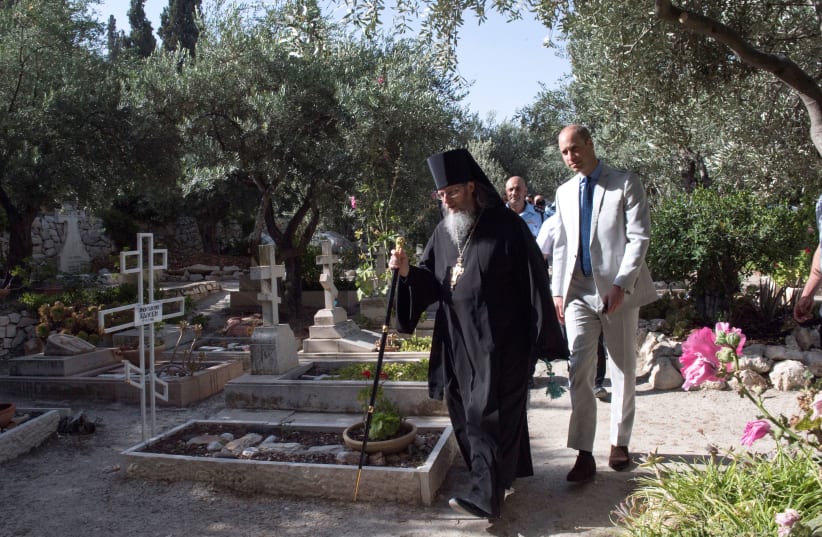Israeli officials expressed their condolences after the British Royal Family announced the death of 99-year-old Prince Philip, the Duke of Edinburgh, husband of Queen Elizabeth, on Friday.
“My deepest condolences and heartfelt sympathy to HM Queen Elizabeth II, HRH The Prince of Wales, the Royal Family and the people of the United Kingdom” tweeted President Reuven Rivlin, adding: “May his memory be a blessing.”
Philip spent four weeks in hospital earlier this year for treatment for an infection to have a heart procedure, but returned to Windsor in early March. He was admitted to the King Edward VII's Hospital on February 16 after he felt unwell, to receive treatment for an unspecified, but not COVID-19-related infection.
Philip’s four sisters each married German nobles, at least three of whom became Nazis. But the prince, educated in Britain, joined the allied war effort. As an adult, he showed little patience for Nazi collaborators; he was instrumental in making a pariah of his wife’s uncle Edward, who after abdicating the throne dallied with Nazi Germany.
Philip over the years spoke several times at Jewish and pro-Israel events.
The prince, who had a passion for environmental preservation, spoke multiple times at Jewish National Fund events and lent his royal sponsorship to other Jewish events. He came under attack in the 1960s for speaking to pro-Israel groups – and, being famously impervious to criticism, ignored the attacks.
Philip’s support for Jewish and pro-Israel causes ran deep. His mother, Princess Alice of Greece, sheltered a Jewish family during the Holocaust and is recognized as one of fewer than 30,000 “righteous among the nations” by Yad Vashem, Israel’s official Holocaust memorial and museum.
This was noted in the condolence statement of Jewish Agency Chairman Isaac Herzog's , when he tweeted that the "Duke of Edinburgh was part of a generation who fought the Nazis in WW2. His mother was a Righteous Among the Nations. May his memory be a blessing."
Yamina head Naftali Bennett tweeted alongside his condolences that, "As the son of a Righteous Among the Nations, and as one dedicated to the British people, he will be remembered with affection."
While she passed away in Buckingham Palace in 1963, Princess Alice's remains were transferred in 1988 from Windsor Castle to the Church of Mary Magdalene at the Russian Orthodox convent on the Mount of Olives in Jerusalem.
Her tomb was visited in 2018 by her great-grandson and Philip's grandson
Prince William in June 2018, some 70 years after Britain quit its mandate in Palestine. His arrival marked the first state visit to Israel by a member of the British royal family.
A year and a half later in January 2020, his father
Prince Charles arrived in Israel for his first extended visit to attend the Fifth World Holocaust Forum marking 75 years since the Red Army’s liberation of Auschwitz. He briefly came to Israel in 1995 for the funeral of Yitzhak Rabin, and again in 2016 for the funeral of Shimon Peres.
In 1994, Philip was the first British royal to visit Israel, when he accepted Yad Vashem’s recognition of his mother and visited her burial site in Jerusalem.
At Yad Vashem, Philip planted a maple tree in memory of his mother, who was married to Prince Andrew of Greece and helped shelter three members of the family of a late Greek-Jewish politician in her Athenian palace. The Gestapo was suspicious of Alice, even questioning her, but the princess, who was deaf, pretended not to understand their questions. She later became a nun.
“The Holocaust was the most horrific event in all Jewish history, and it will remain in the memory of all future generations,” Philip said at the time. “It is, therefore, a very generous gesture that also remembered here are the many millions of non-Jews, like my mother, who shared in your pain and anguish and did what they could in small ways to alleviate the horror.”
The 1994 visit broke with what was then an unofficial but nonetheless binding ban on royals traveling to Israel, which had been enforced following violence by Zionist fighters against British targets in the years that predated the establishment of the State of Israel, in what had been the British Mandate over Palestine before 1948.
For all its trappings, Philip’s 1994 visit was in a personal capacity. The Royal House ended its policy on official visits to Israel in 2018, after William's visit to Jerusalem, the Palestinian Authority and Jordan.
Philip’s retirement from public life in 2017 triggered an outpouring of plaudits for a life well-lived from Jewish groups and leaders.
Those groups expressed grief upon his death Friday. Philip’s life “was spent in public service, from his active duty in the Navy during World War II to the tens of thousands of engagements which he carried out over six and a half decades of royal duties,” the president of the Board of Deputies of British Jews, Marie van der Zyl, wrote in a statement.
